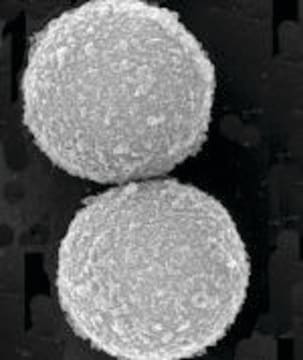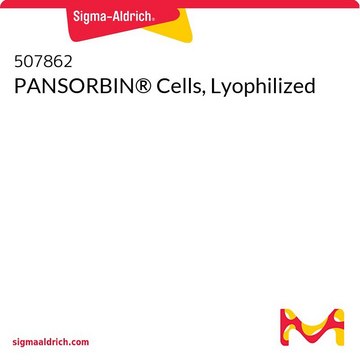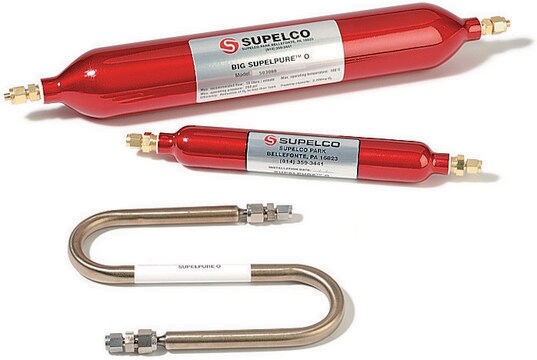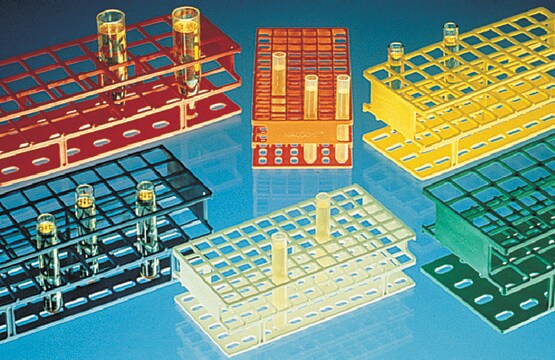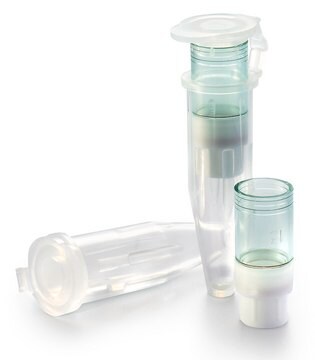507861
PANSORBIN® Cells, Standardized
Sinónimos:
Cell standard
Iniciar sesiónpara Ver la Fijación de precios por contrato y de la organización
About This Item
Código UNSPSC:
41116133
NACRES:
NA.42
Productos recomendados
formulario
liquid
Nivel de calidad
contiene
0.1% sodium azide as preservative
fabricante / nombre comercial
Calbiochem®
condiciones de almacenamiento
do not freeze
capacidad
≥2 mg/mL binding capacity
Condiciones de envío
ambient
temp. de almacenamiento
2-8°C
Descripción general
Heat-killed, formalin-fixed Staphylococcus aureus cells (Cowan I strain) that bear a high cell-surface density of protein A and have been pickled by the method of Kessler. Useful as a solid-phase IgG-binding reagent due to the high-affinity interaction of protein A with the Fc domain of IgG. PANSORBIN cells work best when the antibody is human (IgG1, IgG2, IgG4), rabbit IgG (all isotypes), or mouse (IgG2a, IgG2b, IgG3).
PANSORBIN Cells are heat-killed, formalin fixed Staphylococcus aureus cells that have a coat of protein A and have been pickled by the method of Kessler. Useful for mitogenic stimulation of B lymphocytes and for immunoprecipitation.
Aplicación
Most common applications include immunoprecipitation and mitogenic stimulation of B lymphocytes.
Advertencia
Toxicity: Standard Handling (A)
Forma física
Supplied as a ≥10% (w/v) Staphylococcus aureus cell suspension in PBS, 0.1% sodium azide, pH 7.2.
Otras notas
Kierszenbaum, F., et al. 1991. Immunology74, 317.
Meikle, P.J., et al. 1991. J. Biol. Chem.266, 22569.
Ezaki, O., et al. 1989. Biochem. Biophys. Res. Commun. 159, 1368.
Murakami, H., et al. 1988. Biochem. J.256, 917.
Kessler, S.W. 1975. J. Immunol. 115, 1617.
Meikle, P.J., et al. 1991. J. Biol. Chem.266, 22569.
Ezaki, O., et al. 1989. Biochem. Biophys. Res. Commun. 159, 1368.
Murakami, H., et al. 1988. Biochem. J.256, 917.
Kessler, S.W. 1975. J. Immunol. 115, 1617.
Información legal
CALBIOCHEM is a registered trademark of Merck KGaA, Darmstadt, Germany
PANSORBIN is a registered trademark of Merck KGaA, Darmstadt, Germany
Palabra de señalización
Warning
Frases de peligro
Consejos de prudencia
Clasificaciones de peligro
Acute Tox. 4 Oral
Código de clase de almacenamiento
12 - Non Combustible Liquids
Clase de riesgo para el agua (WGK)
WGK 3
Punto de inflamabilidad (°F)
Not applicable
Punto de inflamabilidad (°C)
Not applicable
Certificados de análisis (COA)
Busque Certificados de análisis (COA) introduciendo el número de lote del producto. Los números de lote se encuentran en la etiqueta del producto después de las palabras «Lot» o «Batch»
¿Ya tiene este producto?
Encuentre la documentación para los productos que ha comprado recientemente en la Biblioteca de documentos.
Menaka D Hapugoda et al.
Clinical and vaccine immunology : CVI, 14(11), 1505-1514 (2007-09-28)
The resurgence of dengue (DEN) virus infections in the last few decades coupled with the lack of a preventive vaccine and specific antiviral drugs has jointly contributed to making this a significant global public health problem. Currently, symptomatic supportive treatment
Use of recombinant vaccinia virus vectors for cell biology.
O A Weisz et al.
Methods in cell biology, 43 Pt A, 137-159 (1994-01-01)
Peifang Sun et al.
Methods in molecular biology (Clifton, N.J.), 1808, 187-196 (2018-06-30)
Dengue envelope (E) protein is a dominant antigen for vaccine development and E-based vaccines have shown partial or full protection against live-virus challenge in non-human primates. Generally, T cell responses can be investigated with peptides. However, hundreds of over-lapping peptides
K E Reed et al.
Methods in molecular medicine, 19, 331-342 (1999-01-01)
Heterologous expression systems have been widely used to study hepatitis C virus (HCV) proteins in lieu of an efficient method for establishing HCV infections in cell culture. Studies of HCV polyprotein processing in both mammalian-cell-based and cell-free expression systems have
Maria Forlenza et al.
Journal of immunology (Baltimore, Md. : 1950), 183(8), 5319-5332 (2009-09-30)
Functional characterization of TNF-alpha in species other than mammalian vertebrates is limited, and TNF-alpha has been studied in a limited number of fish species, primarily in vitro using recombinant proteins. Studies on TNF-alpha from different fish species so far pointed
Nuestro equipo de científicos tiene experiencia en todas las áreas de investigación: Ciencias de la vida, Ciencia de los materiales, Síntesis química, Cromatografía, Analítica y muchas otras.
Póngase en contacto con el Servicio técnico
